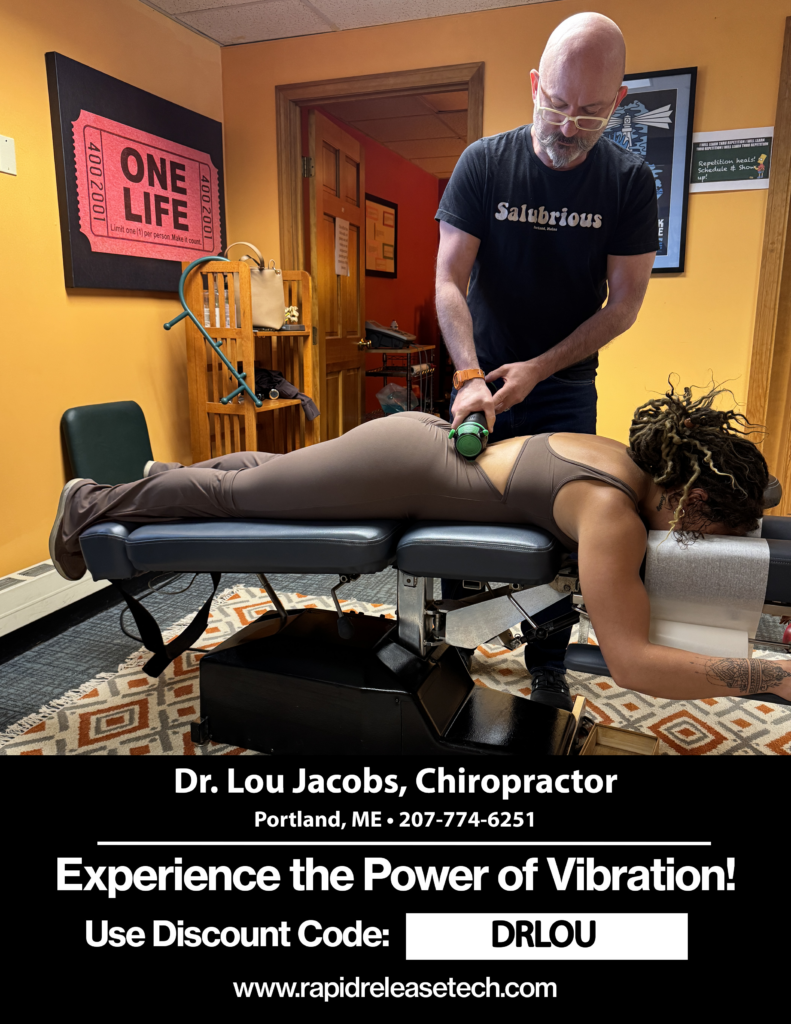Banjo Player Injuries: Common Health Issues, Famous Cases, and Chiropractic Solutions
The banjo is an iconic instrument in bluegrass, folk, and jazz, and we salute you for your efforts to bring us your music. For you, the musicians behind the music, the physical demands can take a serious toll. I regularly see the effects that the long hours of repetitive picking, high string tension, awkward wrist angles, and seated playing posture all lead to. These injuries and long-term health problems can derail a musical career or steal someone’s favorite hobby from them. As a health care guardian of the music, I am compelled to share some banjo player injuries, prevention and management with you.
Let’s explore the most common injuries among banjo players, highlight well-known banjoists who have struggled with these issues, and review how chiropractic care and other conservative therapies can provide effective, drug-free solutions.

Dr. Lou with The Punch Brothers
Common Injuries and Health Issues in Banjo Players
1. Tendinitis and Tenosynovitis
* Overuse of the wrist and fingers from rapid rolls and picking patterns can inflame tendons.
* Players often feel aching, burning, or stiffness along the forearm or wrist.
2. Carpal Tunnel Syndrome
* The repetitive flexion and extension of the wrist can compress the median nerve, causing numbness, tingling, and hand weakness.
3. Ulnar Nerve Entrapment
* Long sessions with bent elbows (common when cradling a banjo) may irritate the ulnar nerve, leading to “ring and pinky finger” numbness.
4. Neck and Shoulder Pain
* The weight of the banjo combined with forward head posture often strains the cervical spine and upper back muscles.
5. Low Back Pain
* Long seated sessions without proper support contribute to stiffness, pain, and poor spinal alignment.
Famous Banjo Players Who Faced Injury
* Earl Scruggs – Earl was the innovator of the three-finger picking style, Scruggs reportedly struggled with hand pain later in life from decades of intensive playing.
* Béla Fleck – Widely known for pushing technical boundaries which requires very intense practice and play, Fleck has spoken in interviews about the physical toll of extensive touring and long practice sessions.
* Tony Trischka – Tony often acknowledged the importance of warm-up routines and body care after dealing with wrist and hand discomfort during his career.
These examples highlight how even the most accomplished players aren’t immune to physical strain. It is not clear to what lengths these folks tried to prevent problems beyond warm-ups and stretching, but most musicians run into problems at some point in their careers. Learning to deal with playing related musculoskeletal disorders early on, may indeed prevent years of struggle, heartache, great expense and pain.
How Chiropractic Care Helps Banjo Players
Chiropractic care provides a holistic, non-invasive way to manage and prevent the injuries banjo players commonly face. Research supports chiropractic’s effectiveness for musculoskeletal conditions:
* Carpal Tunnel Syndrome: A randomized controlled trial found that chiropractic manipulation of the wrist and spine provided significant improvements in grip strength and nerve function (Moeckel & Clark, JMPT, 1997).
* Neck and Shoulder Pain: Systematic reviews confirm that chiropractic spinal manipulation is effective in reducing neck pain and improving function (Cochrane Review, 2019).
* Low Back Pain: Clinical guidelines recommend chiropractic adjustments as a first-line treatment for mechanical low back pain (American College of Physicians, 2017).
For banjo players, chiropractic may help by:
* Correcting spinal misalignments caused by posture and instrument weight.
* Restoring mobility in wrists, elbows, shoulders, and spine.
* Reducing nerve irritation and inflammation linked to repetitive strain.
* Providing ergonomic coaching to reduce stress while playing.
Other Conservative Approaches to Self Guided Prevention
* Stretching and Warm-Ups: Gentle hand, wrist, and shoulder stretches before playing improve circulation and reduce stiffness.
* Instrument Positioning: Adjusting strap height and seated posture prevents unnecessary wrist bending and back strain.
* Rest and Ice/Heat Therapy: Short breaks and alternating ice/heat can manage flare-ups naturally.
* Massage and Soft Tissue Therapy: Helps reduce tension in forearm and shoulder muscles that support banjo playing. Rapid Release Therapy (shown below) is the most effective massage tool for quick release of adhesions, scar tissue and other inhibiting soft tissue issues. It vibrates/oscillates so fast it warms up the muscles, ligaments and tendons as it vibrates the dysfunctional tissue into a state of better function. The tool is amazing, can be used on oneself, and is what I recommend to all of my musician clients. It does not percuss like the meat tenderizing thumping tools like the theragun. The vibration and oscillation are more gentle and more effective.

Rapid Release Therapy Devices that we use in our office are ON SALE NOW! Receive an additional 10% OFF by using the coupon code “DrLou”
Banjo players face unique physical demands that can lead to tendinitis, carpal tunnel syndrome, nerve entrapments, and spinal pain. Even legendary players like Earl Scruggs and Béla Fleck have battled the toll of repetitive playing.
Chiropractic care, supported by research, as well as many ancillary treatment modalities, offer a safe and natural approach to prevention, treatment, and performance optimization. Combined with smart ergonomics, stretching, and supportive therapies, chiropractic helps banjo players stay healthy, and keep the music alive.
Dr. Lou Jacobs, Chiropractor and acupuncturist in Portland, Maine, has been working with and specializing in the health and performance of musicians of all types, for over 23 years. Banjo player injuries are commonplace in his office and with online clients. Dr. Lou’s work has been highlighted in Guitar Player Magazine, and his client list is extensive, having worked with some of the best horn players in the world today. Dr. Lou is always accepting new patients and offers tele-consulting for musicians outside of Southern Maine. Dr. Lou also works with families and is board certified in chiropractic care for children and pregnant moms. Dr. Lou may be reached by calling (207) 774-6251 or by messaging his office manager, Sandra Escobar, at Sandra@DrLouJacobs.com.
……………
All information, content, and material of this video or website is for informational and demonstration purposes only. It is not intended to serve as a substitute for the consultation, diagnosis, and/or medical treatment of a qualified physician or healthcare provider.
Don’t use this content as a replacement for treatment and advice given by your doctor or health care provider. Consult with your doctor or healthcare professional before doing anything contained in this content.
By watching this video, reading this blog or seeing this content under in any other medium under any circumstances, or using any of Dr. Lou’s content, you agree to indemnify and hold harmless Jacobs Chiropractic Acupuncture (and its representatives), Dr. Lou Jacobs for any and all losses, injuries, or damages resulting from any and all claims that arise from your use or misuse of this content. Jacobs Chiropractic Acupuncture and Dr. Lou Jacobs make no representations about the accuracy or suitability of this content.
USE OF THIS CONTENT IS AT YOUR OWN RISK.
With regard to supplements:
These statements have not been evaluated by the Food and Drug Administration. This product is not intended to diagnose, treat, cure, or prevent any disease.
